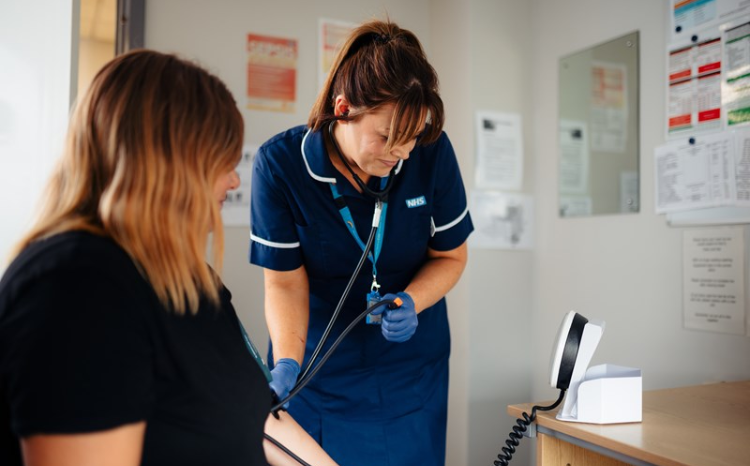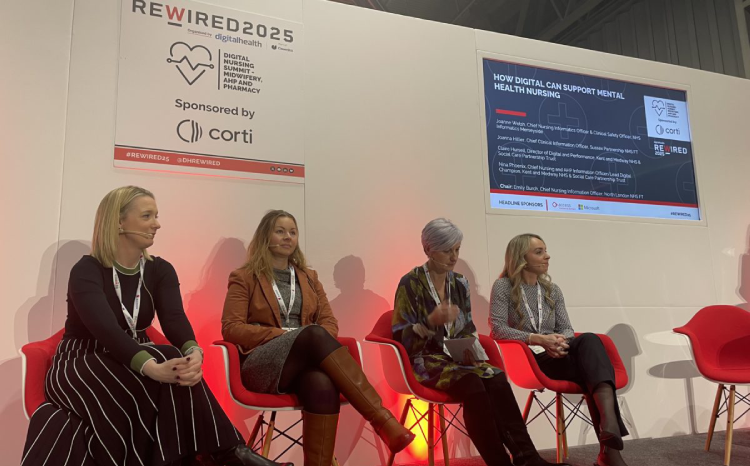Industry news in brief
- 20 May 2022

The latest Digital Health News industry round-up covers a new app for recording vital signs being used at Sheffield Children’s, an initiative to advance cancer research and the accuracy of machine learning algorithms in predicting mental health crises.
Global tech conference brings together professionals
The UK’s Child Health Technology Conference was held virtually on 11 and 12 May and brought together global healthcare professionals and tech experts with the aim of improving children’s health through technology.
Founded by Professor Paul Dimitri, professor of child health at Sheffield Children’s NHS Foundation Trust, it is the second year in a row that the event has taken place.
The event saw engineers, computer scientists, designers, academics and patient representatives join healthcare professionals in tuning in to hear from speakers like Timothy Chou from the US and Alberto E Tozzi from Italy who spoke of the challenges facing the development of AI in paediatric medicine.
Also on the agenda was Dr Terry Fleming from the University of Wellington, New Zealand who spoke about the use of digital tools in youth mental health, and Mike English, senior research fellow at KEMRI-Wellcome Trust in Kenya, who looked at why technically optimised tools often fail to deliver benefits.
Delegates at the event also gained access to the Global Centres of Expertise area of the conference, a dedicated hub on the virtual platform for global information on child health.
Professor Dimitri said: “At a time when long-term conditions in childhood affect millions of children it’s critical to create more opportunity for cross-disciplinary networking and collaboration.”
Aire Logic to lead future Covid-19 and flu vaccination programme
Aire Logic has been awarded the contract to deliver the coronavirus and flu vaccination programme, as part of the Digital Capabilities for Health framework.
The continuation of the programme builds on one of the most complex vaccination roll-outs in the history of the NHS and will support the safe and effective delivery of vaccines to the population.
Aire Logic will use its experience and knowledge in specialist agile delivery to determine the right data and technology solutions needed to optimise national vaccination services.
It aims to reduce the pressure on the NHS while also minimising Covid-19 severity and mortality to support the reopening of society following the pandemic, and help eliminate the spread of the disease.
Joseph Waller, director at Aire Logic, said: “We live in unprecedented times for health and care technology. As the only UK consultancy of our size to specialise in this space, we are delighted to have been selected to deliver this important and critical programme. We look forward to introducing a more hands-on, coal face focused approach to national technology.”
The company will be supporting further enhancements to the programme. It will further build on the technology used to identify cohorts of people called for vaccination based on patient demographic and clinical data.
It will also develop both the national notifications service inviting people to book, and the national bookings service that accommodates the bookings and allows vaccination staff to manage and check-in patients.
In addition, Aire Logic intends to strengthen and enhance data capture services and the technology that underpins those services managing the flow of data.
The company was selected by NHS Digital for the project, which will be led by NHS England and NHS Improvement. It has previously advised on and collaborated with NHS Digital for national services and devised national screening services for Public Health England.
Genomics Pathology Imaging Collection launches
A joint initiative by the National Pathology Imaging Co-operative (NPIC) and Genomics England has resulted in a new initiative being launched which will accelerate cancer research.
The Genomics Pathology Imaging Collection (GPIC) will combine digital pathology and genomic data to create a unique resource for cancer researchers.
The NPIC will scan the pathology images of all of the participants with cancer in Genomics England’s 100,000 Genome Project, which collected genomic data and pathology samples from participants.
This will create a large dataset of over 250,000 digital pathology images with detailed diagnostic information from pathology reports.
Professor Darren Treanor, NPIC director, said: “GPIC will be a unique resource. The images and pathology data in the collection will bridge the gap between the DNA analysis and the pathological features in the patient’s biopsy, enabling scientists to get a better understanding of cancer, opening the door to better diagnosis and treatment for cancer patients.”
Dr Prabhu Arumugam, director of clinical data and imaging at Genomics England, added: “The combination of accessible, high quality genomic, imaging and clinical data at such a scale is unique and will allow us to identify new features of cancer that drive progression or response to treatment.”
Huma wins ‘best of the best digital health product’ award
Huma Therapeutics has won the Prix Galien International 2022 award for ‘best of the best digital health product’ for its remote patient monitoring platform.
The judges selected Huma’s platform which powers digital ‘hospitals at home’ and virtual wards for the award, which compares winners for the previous three years.
The software is able to almost double clinical capacity and reduce hospital readmissions by a third where it is used across the UK and Germany. It also helped inform national policy on silent hypoxia.
Dan Vahdat, CEO and founder at Huma, said: “It is a huge honour to receive this prestigious accolade from the Galien Foundation, one of the most forward-thinking health organisations in the world.
He continued: “Each time we have turned our platform to a new area, it has surpassed all our expectations – whether looking after cardiac patients, running decentralised clinical trials, or acting as a companion app for patients with diabetes.
“We knew we had built something special when we saw feedback from people saying how much our technology has changed their lives.”
The awards were announced at an event at the Natural History Museum in London.
“After a pause due to the COVID-19 pandemic, it was particularly special being safely in-person, celebrating the ‘best of the best’ industry leaders at last night’s ceremony,” said Dr. Sue Desmond-Hellmann, chair of the Prix Galien USA and Prix Galien International Award Committees.
“The Prix Galien International Awards presents the opportunity to showcase dedication and innovation from around the world, and it was an honour to experience that under one roof.”
Koa Health’s machine learning algorithm accurately predicts mental health crises
A machine learning algorithm from Koa Health has been proven to accurately predict more than half of mental health crises 28 days in advance in a real-world NHS setting.
The results suggest that if the technology was to be deployed in a clinical setting it could be used for early intervention of mental health crises supporting improved patient outcomes.
Dr Oliver Harrison, CEO st Koa Health, said: “We were delighted to be chosen as a Wave 1 NHS Test Bed to partner with Birmingham and Solihull NHS Mental Health Foundation Trust.
“We shared a vision of moving from reactive care – driven by crisis – to proactive care – driven by prediction and prevention. We have delivered outstanding results in this trial and look forward to continuing the development work. We believe this is the future of mental healthcare in the UK and worldwide.”
The machine learning model uses electronic health records, anonymised for use, to continuously monitor patients for risk of an impending mental health crisis. It was found to be accurate at predicting crises 28 days in advance without a considerable false positive rate.
A further six-month study corroborated the results, evaluating them for use in clinical practice. In as many as 64 percent of cases, the model proved clinically valuable either in terms of managing caseloads or mitigating the risks of a crisis.
Dr Aleksandar Matic, research and development director at Koa Health, said: ”Prevention is widely seen as the holy grail of treating mental health problems. Using AI to predict mental health crises can enable timely and proactive instead of reactive interventions to mitigate or prevent mental health crises and truly help both patients and healthcare systems.”
The study was run alongside Birmingham and Solihull Mental Health NHS Foundation Trust using anonymised data collected over seven years. The next step is for Koa Health to validate the model in other health systems and to undertake larger scale studies in order to obtain regulatory approval.
Sheffield Children’s records vital signs electronically with new app
Sheffield Children’s NHS Foundation Trust has introduced a new digital app which allows for vital signs observations to be recorded electronically in real time.
The Careflow Vitals app allows nurses to record heart rate, blood pressure and temperature electronically through trust iPhones and iPads on the wards. It replaces the recording of clinical observations on paper paediatric early warning score (PAWS) charts.
Being able to record PEW scores helps in identifying children and young people who are at risk of deteriorating and ensuring their care can be escalated if necessary.
Dr Jeff Perring, executive medical director at Sheffield Children’s, said: “Vitals is one of a number of Digital Journey projects which are helping the trust to move from paper-based activities to digital solutions, and improving processes and patient care.
“Recording patient observations via the Vitals app will speed up the process as our nurses can do it instantly in real time and at the bedside. It will allow other health care workers to review PEW charts digitally (and away from the patient bedside) which will aid communication around patient care.”
The app also integrates with the trust’s Careflow Connect system, which allows clinicians to digitally record patient handovers. Both Careflow Connect and Careflow Vitals have been developed and implemented by System C.
Careflow Vitals has been launched initially on Wards 1, 2 and 3. Over the coming weeks it will be rolled out across other Sheffield Children’s inpatient wards and the emergency department.




